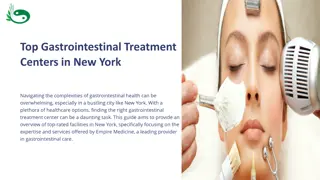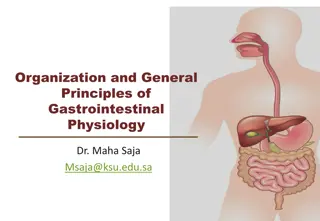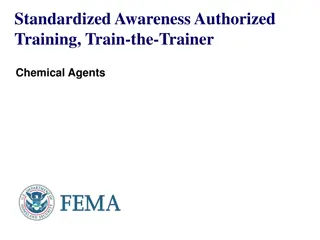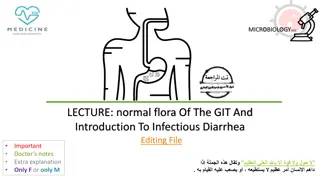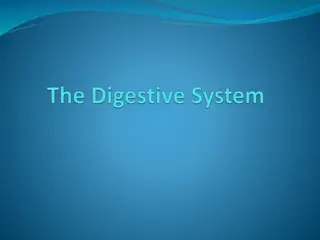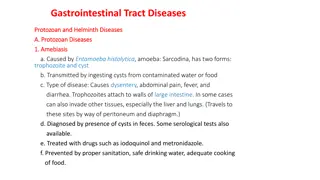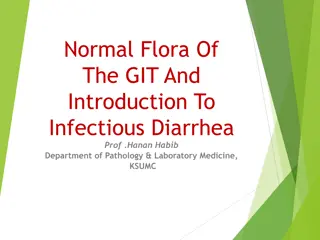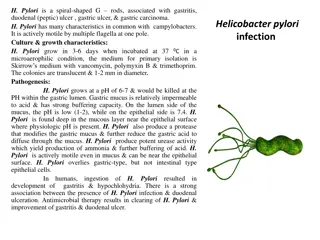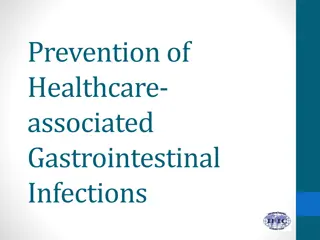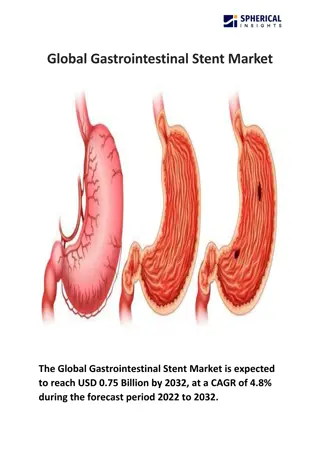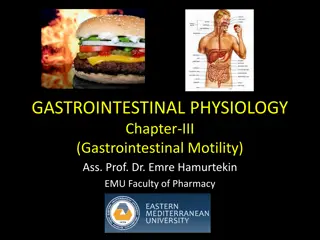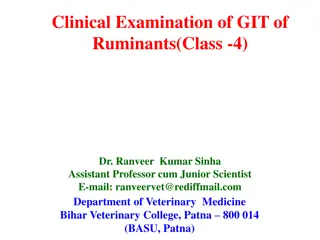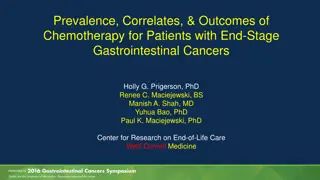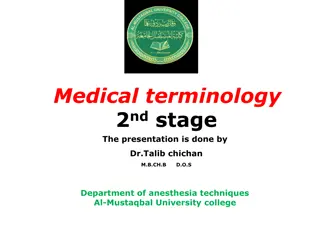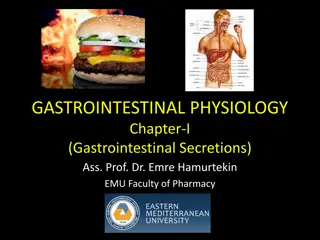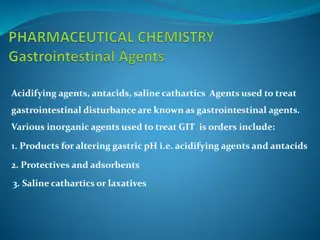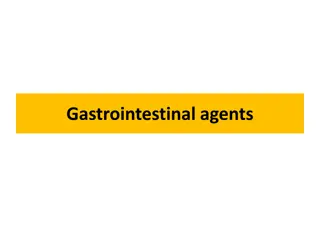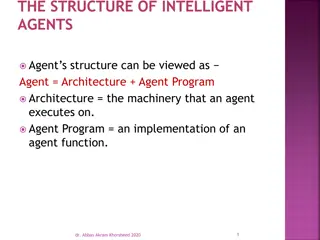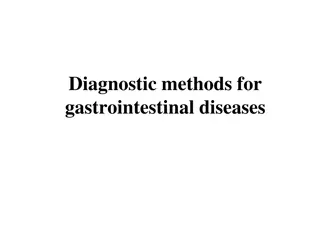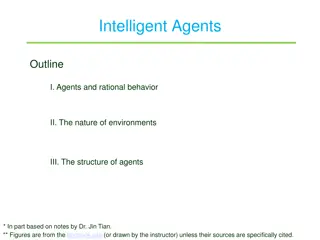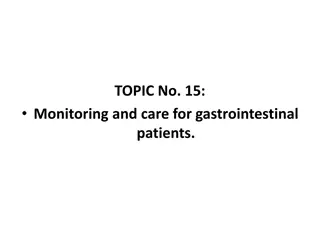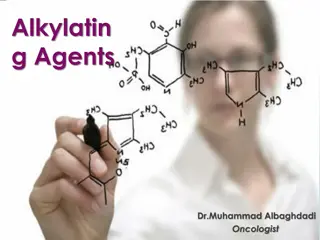Lecture series Gastrointestinal tract
Professor Shraddha Singh from the Department of Physiology at KGMU in Lucknow presents a comprehensive lecture series on the gastrointestinal tract.
8 views • 29 slides
Adaptasi Fisiologi Sistem Urinari dan Gastrointestinal pada Kehamilan
Proses adaptasi fisik, anatomis, dan fisiologis ibu hamil terhadap perubahan selama kehamilan dijelaskan. Adaptasi sistem urinari termasuk efek progesteron, peningkatan LFG, dan aliran plasma ginjal. Adaptasi sistem gastrointestinal melibatkan perubahan pada sistem pencernaan. Popular
3 views • 8 slides
Top-Gastrointestinal-Treatment-Centers-in-New-York
Navigating the complexities of gastrointestinal health can be overwhelming, especially in a bustling city like New York. With a plethora of healthcare options, finding the right gastrointestinal treatment center can be a daunting task. This guide aims to provide an overview of top-rated facilities i
0 views • 6 slides
Essential Overview of Gastrointestinal Physiology
Exploring the organization and general principles of gastrointestinal physiology, this content covers the anatomical and functional aspects of the GI system, including smooth muscle characteristics, neural control, blood flow, nutrient absorption, waste excretion, and regulatory functions like immun
0 views • 46 slides
Chemical Agents Awareness Training Overview
This training module covers standardized awareness and authorized training on chemical agents, including toxic industrial chemicals, riot control agents, and chemical warfare agents. Participants will learn about the physiological signs/symptoms, advantages/disadvantages of using chemical agents for
1 views • 20 slides
Understanding Digestion and Absorption in the Gastrointestinal Tract
Digestion and absorption in the gastrointestinal tract are crucial processes for breaking down carbohydrates, fats, and proteins into smaller compounds that can be absorbed by the body. Carbohydrates undergo hydrolysis to convert into monosaccharides, fats are broken down from triglycerides, and pro
1 views • 22 slides
Understanding Normal Flora of the Gastrointestinal Tract & Infectious Diarrhea
Normal flora in the gastrointestinal tract play a crucial role in maintaining health, but can also cause disease in certain conditions. This lecture covers the common flora in the GIT, their role in diseases, various types of acute diarrheal illnesses, epidemiology, and management of bacterial agent
1 views • 26 slides
Exploring Logical Agents and Architectures in Wumpus World
Explore the use of logical agents in the Wumpus World domain through three agent architectures: reflex agents, model-based agents, and goal-based agents. Understand how these agents operate in the challenging environment of the Wumpus World, where the task is to find the gold, return to starting pos
0 views • 21 slides
Selection and Appointment of Foreign Sales Agents: A Comprehensive Guide
Learn about the process of selecting and appointing foreign sales agents in international marketing, including the meaning of agency, content of foreign sales agency contracts, reasons for appointing agents, factors influencing agent selection, as well as the advantages and disadvantages of working
0 views • 12 slides
Understanding Intelligent Agents in Artificial Intelligence
Intelligent agents in artificial intelligence act rationally to achieve the best outcomes in various environments. They operate autonomously, perceive their surroundings, adapt to changes, and pursue goals efficiently. Developing intelligent agents involves examining agents, environments, and their
1 views • 22 slides
Overview of the Gastrointestinal System and Its Functions
The alimentary tract supplies the body with water, electrolytes, and nutrients through processes like movement of food, digestion, absorption, and circulation. The gastrointestinal tract, starting from the mouth to the anus, is aided by accessory organs for digestion. Functions include motility, sec
0 views • 29 slides
Understanding Antineoplastic Agents in Pharmaceutical Chemistry
Antineoplastic agents, such as alkylating agents, target DNA or DNA replication to induce apoptosis in cancer cells. Alkylation of DNA can lead to cell death through various mechanisms, including p53 activation. Resistance to alkylating agents can develop in cancer cells. The process involves nucleo
1 views • 94 slides
Understanding Adjuvants and Herbicide Formulation
Adjuvants are additives that enhance herbicide effectiveness, crucial for optimal weed control. Types include surfactants, stabilizing agents, coupling agents, humectants, deposit builders, and more. Surfactants aid in wetting and spreading herbicides, stabilizing agents keep suspensions intact, cou
0 views • 10 slides
Understanding the Normal Microbial Flora of the Human Body
The normal microbial flora, also known as the indigenous microbiota, inhabit various areas of the human body such as the gastrointestinal tract, respiratory tract, genitourinary tract, and skin. They play a crucial role in maintaining health and can re-establish themselves when disturbed. While resi
0 views • 22 slides
Comprehensive Overview of Gastrointestinal Tract Diseases
This detailed guide covers various gastrointestinal tract diseases caused by protozoa and helminths, including amebiasis, giardiasis, pinworm infestation, and trichinosis. It discusses their causes, symptoms, transmission, treatment, and prevention methods. The content provides insights into the lif
0 views • 9 slides
Understanding the Normal Flora of the Gastrointestinal Tract and Infectious Diarrhea
Explore the common normal flora of the gastrointestinal tract (GIT) and how they play a role in health and disease, specifically focusing on infectious diarrhea. Learn about different types of acute diarrheal illnesses, epidemiology, host defenses against GI infections, and the pathogenesis of bacte
0 views • 38 slides
Understanding the Impact of the Tenants Fee Ban on Landlords and Agents
The Tenants Fees Act bans all fees from letting agents and landlords to tenants, impacting the rental market significantly. This article explores what can be charged to tenants, reasons for using an agent, services provided by agents, and insights from landlords on the changing landscape post-ban. A
0 views • 13 slides
Understanding Agency Relationships in Business
Agency relationships in business involve principals appointing agents to act on their behalf. There are different types of agents, such as general agents, special agents, factors, brokers, del credere agents, confirming houses, and commercial agents. Each type of agent has specific roles and respons
0 views • 18 slides
Helicobacter Pylori: Characteristics, Pathogenesis, and Diagnosis
Helicobacter pylori is a spiral-shaped Gram-negative bacterium associated with various gastrointestinal conditions like gastritis, duodenal ulcers, gastric ulcers, and gastric carcinoma. It exhibits unique characteristics in common with Campylobacters and has specific culture and growth requirements
0 views • 5 slides
Preventing Healthcare-associated Gastrointestinal Infections
Learn about the types of microorganisms that cause gastrointestinal infections in healthcare settings, understand the risk factors, and discover methods for prevention. Key points include isolation, contact precautions, decontamination, antibiotic stewardship, hand hygiene, and food production contr
0 views • 39 slides
Global Gastrointestinal Stent Market
The Global Gastrointestinal Stent Market is expected to reach USD 0.75 Billion by 2032, at a CAGR of 4.8% during the forecast period 2022 to 2032.\n\n
1 views • 5 slides
Understanding Gastrointestinal Motility: Key Concepts and Mechanisms
Gastrointestinal motility involves various processes like peristalsis, segmentation, basic electrical activity, and the migrating motor complex. Peristalsis is the reflex response to gut wall stretching, while segmentation helps mix intestinal contents and digestive juices. Basic Electrical Rhythm (
0 views • 19 slides
Understanding Intelligent Agents in Chapter 2
This chapter delves into the concept of agents and environments in the realm of intelligent systems. It explores the types of agents, their functions, and interactions with environments. Rationality, performance measures, and the essence of being a rational agent are key aspects discussed. The vacuu
0 views • 28 slides
Understanding the Secretions of the Gastrointestinal Tract (GIT)
The gastrointestinal tract (GIT) is responsible for digestion, absorption, and secretion through various glands along the alimentary canal. Secretions are stimulated by factors like direct contact, nervous system activation, and hormonal regulation. Hormones released in response to food presence hel
0 views • 7 slides
2013 Membership Development Award: Young Agents Committee Success Story
The Young Agents Committee of the Independent Insurance Agents of Georgia, Inc., won the 2013 Membership Development Award for their outstanding recruitment and retention efforts. Their theme focused on perpetuation, increasing active membership by 36%. Through grassroots development, live registrat
0 views • 10 slides
Clinical Examination of Gastrointestinal Tract in Ruminants - Summary and Observations
Detailed examination of the gastrointestinal tract (GIT) in ruminants is crucial for diagnosing various diseases. Dr. Ranveer Kumar Sinha, an Assistant Professor cum Junior Scientist at Bihar Veterinary College, provides insights into the clinical examination, anatomy, history, and observations rela
0 views • 29 slides
Understanding Leavening Agents in Baking
This content delves into the importance of leavening agents in baked goods, discussing natural leavening agents, the chemical processes of baking soda and baking powder, the role of yeast leavening, and the differences between quick breads and other baked products. It also covers the leavening agent
0 views • 9 slides
Understanding Knowledge-Based Agents: Inference, Soundness, and Completeness
Inference, soundness, and completeness are crucial concepts in knowledge-based agents. First-order logic allows for expressive statements and has sound and complete inference procedures. Soundness ensures derived sentences are true, while completeness guarantees all entailed sentences are derived. A
0 views • 6 slides
Chemotherapy Utilization in End-Stage Gastrointestinal Cancer Patients
This presentation explores the prevalence, correlates, and outcomes of chemotherapy use in patients with end-stage gastrointestinal cancers. Data is presented on the frequency of chemotherapy administration, correlates, harms, and benefits in patients in their final months of life. Insights from stu
0 views • 21 slides
Understanding Agents in OPM Workshop by Luc Moreau
Delve into the concept of agents in OPM Workshop facilitated by Luc Moreau. Explore the nature of agents, their differences from artifacts, causes of their behavior, and challenges in their utilization. Discover the role of enactors, executables, and workflows in generating and controlling agents. U
0 views • 5 slides
Comprehensive Overview of Medical Terminology in Gastrointestinal System
This content provides a detailed exploration of medical terminology related to the gastrointestinal system. It covers definitions, word roots, combining vowels, suffixes, and prefixes commonly used in this medical field. The material includes information on anatomical terms such as anus, appendix, c
0 views • 18 slides
Overview of Gastrointestinal Secretions and Structural Considerations
In this informative presentation by Assistant Professor Dr. Emre Hamurtekin, the focus is on gastrointestinal secretions including salivary, gastric, pancreatic, biliary, and intestinal fluids. Structural considerations such as the surface area for absorption, sphincters, villi, and crypts are discu
0 views • 33 slides
Understanding Gastrointestinal Agents: Acidifying Agents, Antacids, Saline Cathartics
Gastrointestinal agents such as acidifying agents, antacids, and saline cathartics are used to manage gastrointestinal disturbances. Acidifying agents like Hydrochloric Acid aid in gastric digestion, while antacids help reduce gastric acidity. Saline cathartics are used as laxatives. Achlorhydria, a
0 views • 36 slides
Understanding Peer Prediction Mechanisms in Learning Agents
Peer prediction mechanisms play a crucial role in soliciting high-quality information from human agents. This study explores the importance of peer prediction, the mechanisms involved in incentivizing truthful reporting, and the convergence of learning agents to truthful strategies. The Correlated A
0 views • 7 slides
Understanding Gastrointestinal Agents and Disorders
Learn about gastrointestinal agents used in the treatment of GIT disorders such as achlorhydria, hyperacidity, diarrhea, and constipation. Explore the classification of gastrointestinal agents including gastric acidifiers, antacids, protectives, adsorbents, and cathartics. Discover the causes and sy
0 views • 45 slides
Overview of Intelligent Agents: Structures and Types
The structure of intelligent agents consists of architecture and agent program. Different types of intelligent agents include simple reflex agents, model-based reflex agents, goal-based agents, and utility-based agents. Each type operates based on specific characteristics and methods to make decisio
0 views • 19 slides
Diagnostic Methods for Gastrointestinal Diseases: A Comprehensive Overview
Explore various diagnostic methods for gastrointestinal diseases, including laboratory investigations, abdominal ultrasound features, and radiology techniques. Learn about the significance of different tests such as ESR, blood count, liver tests, and abdominal ultrasound in diagnosing conditions aff
0 views • 40 slides
Understanding Intelligent Agents: Key Concepts and Rational Behavior
Intelligent agents operate based on perceptions, reasoning, and actions within various environments. Agents function through a sequence of percepts, utilizing programs to interpret their architecture. The Vacuum-Cleaner World serves as an illustrative environment for agent behavior, highlighting the
0 views • 31 slides
Essential Monitoring and Care for Gastrointestinal Patients
Learn about monitoring and caring for gastrointestinal patients, including identifying key symptoms like appetite changes, taste alterations, swallowing difficulties, gastric dyspepsia, and more. Discover how to provide proper nursing care, address acute abdominal pain and gastrointestinal bleeding,
0 views • 28 slides
Understanding Alkylating Agents in Oncology: Mechanisms and Pharmacokinetics
Alkylating agents have a long history as anti-cancer drugs, with Mechlorethamine being the first developed in 1942. They react with cells in all phases of the cell cycle, causing DNA alkylation and cross-link formation. Common alkylating agents include Cyclophosphamide, Melphalan, and Temozolomide.
0 views • 75 slides


